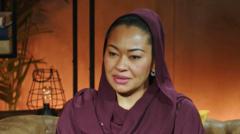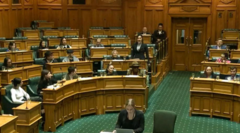The case underscores ongoing challenges regarding gender equality and women's rights within Nigerian politics.
Nigerian Senator Decries 'Cult-Like' Senate After Harassment Allegations

Nigerian Senator Decries 'Cult-Like' Senate After Harassment Allegations
Natasha Akpoti-Uduaghan claims she’s punished for speaking out against sexual harassment in the political system.
In a striking revelation, Nigerian Senator Natasha Akpoti-Uduaghan, who was recently suspended, has likened the Senate's operations to those of a "cult." This assertion comes in light of her allegations of sexual harassment against Senate President Godswill Akpabio, which he has vehemently denied. Akpoti-Uduaghan, representing the opposition Peoples Democratic Party (PDP), argues that her six-month suspension for declaring the harassment is an attempt to enforce silence within the Senate, a claim rejected by Senate officials.
In a candid interview, she described the Senate as resembling a dictatorship where freedom of speech is nonexistent and dissent is swiftly punished. “The Senate president runs the Senate like a dictator, not a democrat," she stated, drawing attention to the oppressive atmosphere faced by those who challenge the status quo. Following her suspension, Akpoti-Uduaghan expressed concerns for the safety of herself and her young child, particularly as her security personnel were revoked.
Akpoti-Uduaghan claimed the harassment began when she visited Akpabio’s residence, where he made suggestive remarks. Furthermore, she recounted a sexist comment wielded during senate meetings that underlined the culture of male dominance within the institution. In response, Senate Deputy Chief Whip Onyekachi Nwebonyi denied these claims, labeling them as false.
Despite being one of only four women in a 109-member legislature, Akpoti-Uduaghan's efforts to address her allegations faced procedural dismissal. She highlighted the grim reality for women in Nigeria's political landscape, where dangerous repercussions can arise from speaking out against powerful figures.
Women's rights activists have rallied in support of Akpoti-Uduaghan, emphasizing the necessity for a thorough investigation into her claims. They view her suspension as a setback for female representation in governance, given the country's low rates of women participating in political roles. In light of the escalating tensions, protests erupted in Abuja, showcasing division around the controversial Senate president and Akpoti-Uduaghan's situation.
Moreover, Akpoti-Uduaghan has detailed a history of adversity throughout her political career, having faced resistance and violence even before her accusations against Akpabio. She has since initiated legal proceedings to contest her suspension and reiterated her commitment to addressing both the harassment and the systemic issues affecting women in politics.
Drawing strength from both family and solidarity among women parliamentarians across Africa, Akpoti-Uduaghan remains resolute in her advocacy. “For many women in Nigeria who cannot voice their experiences, I see it as my duty to speak out,” she affirmed, underscoring the collective struggle for gender equality and justice.
In a candid interview, she described the Senate as resembling a dictatorship where freedom of speech is nonexistent and dissent is swiftly punished. “The Senate president runs the Senate like a dictator, not a democrat," she stated, drawing attention to the oppressive atmosphere faced by those who challenge the status quo. Following her suspension, Akpoti-Uduaghan expressed concerns for the safety of herself and her young child, particularly as her security personnel were revoked.
Akpoti-Uduaghan claimed the harassment began when she visited Akpabio’s residence, where he made suggestive remarks. Furthermore, she recounted a sexist comment wielded during senate meetings that underlined the culture of male dominance within the institution. In response, Senate Deputy Chief Whip Onyekachi Nwebonyi denied these claims, labeling them as false.
Despite being one of only four women in a 109-member legislature, Akpoti-Uduaghan's efforts to address her allegations faced procedural dismissal. She highlighted the grim reality for women in Nigeria's political landscape, where dangerous repercussions can arise from speaking out against powerful figures.
Women's rights activists have rallied in support of Akpoti-Uduaghan, emphasizing the necessity for a thorough investigation into her claims. They view her suspension as a setback for female representation in governance, given the country's low rates of women participating in political roles. In light of the escalating tensions, protests erupted in Abuja, showcasing division around the controversial Senate president and Akpoti-Uduaghan's situation.
Moreover, Akpoti-Uduaghan has detailed a history of adversity throughout her political career, having faced resistance and violence even before her accusations against Akpabio. She has since initiated legal proceedings to contest her suspension and reiterated her commitment to addressing both the harassment and the systemic issues affecting women in politics.
Drawing strength from both family and solidarity among women parliamentarians across Africa, Akpoti-Uduaghan remains resolute in her advocacy. “For many women in Nigeria who cannot voice their experiences, I see it as my duty to speak out,” she affirmed, underscoring the collective struggle for gender equality and justice.






















